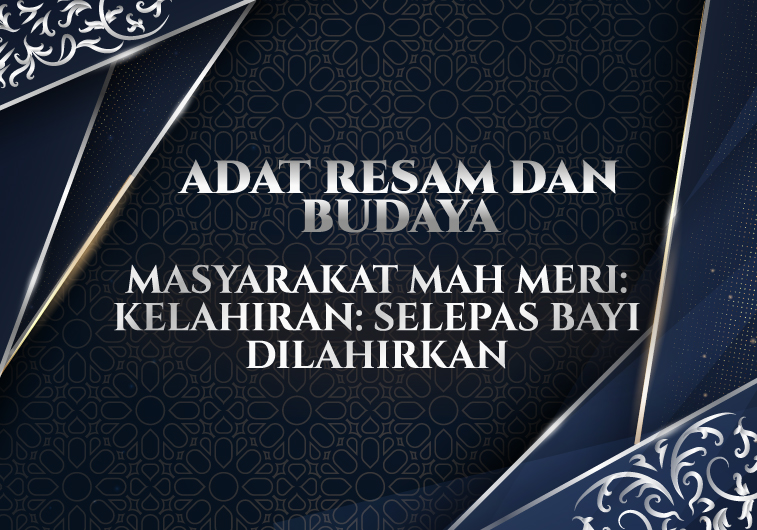ARTS AND CULTURE INFORMATION GATEWAY
Immerse yourself in the colorful world of art and culture! From traditional heritage to contemporary works, discover uniqueness that reflects the nation's identity and identity
ADAT RESAM DAN BUDAYA MASYARAKAT MAH MERI KELAHIRAN: SELEPAS BAYI DILAHIRKAN
Picture
1
Video
No record
Today's Visitor
8
Number of Visitors
1330
Introduction and history
The Mah Meri tribe, one of the Orang Asli groups in Malaysia, has rich and unique customs in every aspect of their lives, including birth ceremonies and baby naming. The naming process in the Mah Meri culture involves important customs that aim to safeguard the baby's well-being and protect it from the interference of evil spirits.
The Mah Meri community is one of the Orang Asli groups living in Peninsular Malaysia, particularly in the coastal areas of Selangor, such as Carey Island. They belong to the Senoi tribe and are known for their rich cultural heritage, including the internationally renowned art of wooden mask carving.
As a society that greatly respects the environment, Mah Meri's traditional beliefs are closely related to nature and the spirits of ancestors. They believe that every aspect of life, including birth and naming, has a connection with the spiritual world and requires the blessing and protection of the ancestral spirits.
In the context of the moment after the birth of a child from a married couple, naming is an important ceremony because the Mah Meri community believes that there is a spiritual power that protects the baby from any threat, including the interference of evil spirits. This process is done with custom and tradition, reflecting their deep belief in the balance between man, nature, and spirit.
The following is the role of customs and culture of the Mah Meri community after the baby is born:
Birth Ceremony: The baby's family holds a special ritual to welcome the baby's arrival and pray for the safety and well-being of the baby and mother.
Spiritual Cleansing: The process of spiritual cleansing is carried out through certain rituals to ensure that the baby is protected from the interference of evil spirits.
Baby Names: Baby naming is done according to community beliefs, usually based on signs or unique characteristics that occur at birth.
Prohibition: Mother and baby are bound by certain taboos, such as not being able to leave the house for a certain period of time, in order to avoid interference from supernatural beings.
Role of Traditional Midwives: Midwives play an important role in caring for the health of mothers and babies after birth, including giving advice on nutrition and traditional care.
Spirit Worship Ceremony: The Mah Meri community will perform spirit worship or offerings to the spirits of the ancestors to ask for protection and well-being for the newborn baby.
Symbols of Protection: Babies are also protected from negative threats through the use of charms or certain objects, such as wooden statues.
After the baby is born, the umbilical cord is cut using a sharp bamboo shard, and the baby is bathed in warm water. The baby's umbilical cord is washed, mixed with turmeric powder, salt, white pepper, galangal, and benzoin, and then planted near the house in a hole one foot deep. For seven days, the lamp is installed where the umbilical cord is planted. The Mah Meri community considers the umbilical cord a baby's brother or sister and, therefore, should be planted perfectly.
Reference Source
Bahan Bacaan:
Azyantee Mohd Zawawi. (2013) Amalan Tabu Suku Mah Meri Tanjung Sepat, Banting Selangor. Fakulti Bahasa Moden dan Komunikasi Universiti Putra Malaysia. Melayu: Jurnal Antarabangsa Dunia Melayu Jilid 6 Bil. 2 2013.
Mohd Adzlam Mat Sidek. (2024). MAH MERI – Tradisi Memperingati Moyang Laut. Malaysian Gazette. https://malaysiagazette.com/2024/02/16/mah-meri-tradisi-memperingati-moyang-laut/
Tokoh (jika ada temu bual tokoh) - Tiada -
Location
State JKKN Contact Information
Ahmad Zaimy bin Mohd Yusoff
Cultural Officer
Jabatan Kebudayaan dan Kesenian Negara, Selangor
Tingkat 6, Menara Korporat,
Kompleks IDCC Shah Alam
Jalan Pahat L 15/L, Seksyen 15
40200 Shah Alam,
SELANGOR DARUL EHSAN
03-5543 1654 /1763








